Moniek Bloks's Blog, page 40
August 22, 2024
The Year of Isabella I of Castile – The short life of Miguel de la Paz
The sudden death of Queen Isabella I of Castile’s only son, John, Prince of Asturias, and the subsequent stillbirth of his daughter made Isabella’s namesake eldest daughter the new heiress presumptive.
The younger Isabella married Afonso, Prince of Portugal, in 1491, but he died in a horse-riding accident a few months later. After returning home to her parents, she eventually married Manuel I, King of Portugal, in 1497.
By the time Manuel and Isabella returned to Castile to be sworn in as heirs to Castile in August 1498, she was pregnant. This was a relief for the Aragonese, who would have preferred a man to inherit. If Isabella had a son, he would inherit everything. While at Zaragoza to discuss this matter, Isabella went into labour and gave birth to a son on 23 August 1498.
However, she was still very malnourished from all the fasting she had done during her mourning, and she died within an hour of giving birth. A historian at court wrote to the Archbishop of Braga, “The mother [Queen Isabella] was large, while the daughter [Isabella] was so consumed by her thinness that she did not have the strength to resist the birth… Scarcely had the child emerged from her uterus than the mother’s spirit was extinguished… Despite this, let’s fix it so that this tragic tale ends with a (more) musical refrain. There is compensation for so much misfortune, an important lightener to such a deep pain: she gave birth to a son.”1
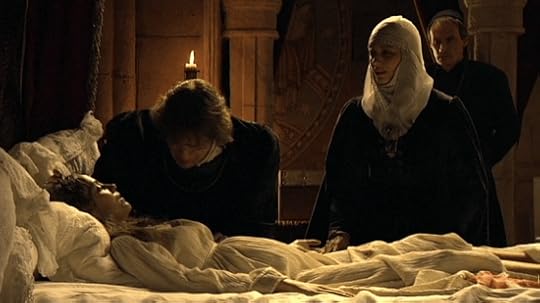 Isabella dying in childbirth as portrayed in Isabel (2012) (Screenshot/Fair Use)
Isabella dying in childbirth as portrayed in Isabel (2012) (Screenshot/Fair Use)Isabella asked to be buried dressed as a nun and to be interred at the Convent of Santa Isabel in Toledo. Queen Isabella held her daughter in her arms as she died.2 Isabella had reportedly foreseen her death in childbirth, and “she made sure that the final communion was well prepared and continually made priests come to her so that she could confess. And if, by mistake, she made some error, she would plead, weeping on her knees, to be given absolution.”3
Isabella had requested that if she gave birth to a girl, she would be named Ana, and if it was a boy, it should be Miguel. And so the little boy became Miguel de la Paz. He was granted Aragonese succession rights on top of the rights he had in Castile and Portugal. He was a sickly child, and Manuel left him in the care of Queen Isabella when he returned to Portugal.
In July 1499, Queen Isabella travelled to the Alhambra in Granada, taking with her little Miguel and her two remaining daughters, Maria and Catherine. She found solace in the little boy’s presence as “with the child’s birth, whatever the state of his health, all debate over primogeniture is over.”4 She kept Miguel close, but he remained a sickly child.
 The death of Miguel de la Paz as portrayed in Isabel (2011) (Screenshot/Fair Use)
The death of Miguel de la Paz as portrayed in Isabel (2011) (Screenshot/Fair Use)On 19 July 1500, Queen Isabella held her young grandson as he, too, died. He was just 22 months old. Isabella’s grief was so great that one observer wrote, “So great grief has swept over our most Christian princes and the whole court that no one has been able as yet to approach or even address the Queen. For the King and Queen are bowed down with great distress, as is no wonder since within so brief a time they have lost three renowned princes, all legitimate heirs.”5
The new heiress was Isabella’s second daughter, Joanna.
The post The Year of Isabella I of Castile – The short life of Miguel de la Paz appeared first on History of Royal Women.
August 20, 2024
Empress Dowager He – The Empress Dowager who caused the downfall of the Han Dynasty
Empress Dowager He has been known in history for causing the downfall of the Han Dynasty.[1] She was the second Empress of Emperor Ling of the Eastern Han Dynasty. History has often depicted her in a negative light.[2] She has often been portrayed as vicious and tyrannical.[3] Yet, the events during her short-lived regency led to the Han Dynasty’s eventual downfall.
Empress Dowager He was born in Wan in Nanyang Commandery.[4] Her personal name is unknown. She came from a humble but wealthy family.[5] Her father’s name was He Zhen, who was a butcher.[6] Her mother’s name is unknown. She had two older half-brothers named He Jin (who later became General-in-Chief) and He Miao.[7] She also had a younger unnamed sister.
Lady He entered Emperor Ling’s harem. Because of her lowly background, Lady He would not have been qualified to become an imperial concubine.[8] However, her family bribed the palace eunuchs to let her become an imperial concubine.[9] She was given the title of Honoured Lady.[10] She was very beautiful, and she quickly caught Emperor Ling’s eye.[11] She became his favourite.[12] In 176 C.E., Honoured Lady He bore a son named Prince Liu Bing (who would later be known as Emperor Shao).
On 8 January 181 C.E., Honoured Lady He was invested as Empress of China. Her father was given the posthumous title of Marquis.[13] Her half-brother, He Jin, was made General of the Household.[14] It was said that she was very “fierce”,[15] and she “struck terror in the women of the Rear Palace.”[16] She was also known to be very jealous.[17] Emperor Ling eventually lost interest in her.[18] He no longer favoured her.[19]
Emperor Ling’s new favourite was Beautiful Lady Wang.[20] When Beautiful Lady Wang became pregnant, she was very afraid that Empress He would try to kill her child.[21] She tried to hide her pregnancy.[22] She even took medicine to cause a miscarriage.[23] However, the medicine did not work. On 2 April 181 C.E., Beautiful Lady Wang gave birth to a son named Prince Liu Xie (who would later be known as Emperor Xian, the last Emperor of the Han Dynasty). When Empress He found out that Beautiful Lady Wang had given birth to a son, she was furious.[24] She poisoned Beautiful Lady Wang’s medicine, and she died.[25] When Emperor Ling learned of Beautiful Lady Wang’s death, he was so outraged that he wanted to depose Empress He.[26] However, Empress He had the support of the palace eunuchs.[27] They persuaded the Emperor to not depose her.[28] Emperor Ling gave Prince Liu Xie to his mother, Empress Dowager Dong, to raise.[29]
On 13 May 189 C.E., Emperor Ling died. He did not appoint an heir.[30] Emperor Ling did not think Empress He’s son, Prince Liu Bing, was suitable to be the Emperor.[31] Instead, he wanted to make his other son, Prince Liu Xie, the next Emperor.[32] However, Empress Ling and her half-brother, He Jin (who was eventually promoted to General-in-Chief), were very powerful.[33] Thus, he never appointed a Crown Prince.[34] Before his death, Emperor Ling entrusted Prince Liu Xie to his palace eunuch, Jian Shuo.[35] Without an heir apparent, Empress He and He Jin successfully installed Prince Liu Bing as the next Emperor.[36] He became Emperor Shao, and he was thirteen years old.[37] Empress He became the Empress Dowager and was made Regent.[38] Liu Xie was made Prince of Bohai, then later Prince of Chenliu.
In the summer of 189 C.E., He Jin wanted to eradicate the eunuch faction that was very powerful during both the reigns of Emperor Huan and Emperor Ling.[39] However, Empress Dowager He advised him that it would lead to chaos.[40] He Jin had no choice but to abandon his plans.[41] He Jin did manage to arrest Jian Shuo and have him executed.[42] After the execution, He Jin’s ally, Yuan Shao, advised him to begin the eradication of the palace eunuch faction.[43] Empress Dowager He again rejected the idea.[44]
He Jin secretly summoned his military officials to the capital to eliminate the palace eunuch faction.[45] One of them would be Dong Zhuo, who would later depose Emperor Shao. When Empress He learned of her brother’s plan, she quickly dismissed many palace eunuchs.[46] However, the leader of the eunuch faction, Zhang Rang, asked Empress He for help.[47] Empress He agreed. She summoned the eunuchs to return to the palace to defend themselves against the attack.[48]
The eunuchs decided to defend themselves by plotting the assassination of He Jin.[49] They lured He Jin to the palace using Empress Dowager He’s name.[50] Once He Jin arrived at the palace, the eunuchs ambushed him, stabbed him, and killed him.[51] When He Jin’s subordinates, Wu Kuang, Zhang Zhang, Yuan Shao, Hu Ben Zhonglang, and Yu Shu, heard about He Jin’s murder, they wanted revenge against the palace eunuchs.[52] They set fire to the palace gates to lure the eunuchs out of the palace.[53] Zhang Rong and ten other eunuchs took Empress Dowager He and Emperor Shao through the North Palace Gate, which was the only gate still open, and fled the city of Luoyang.[54]
Dong Zhuo finally arrived at Luoyang with his army and took control of the city.[55] He sent Lu Zhi and Min Gong to bring Empress Dowager He and Emperor Shao back to the palace.[56] Lu Zhi found Empress Dowager He and Emperor Shao near the bank of the Yellow River.[57] He brought them back. When Emperor Shao was greeted by Dong Zhuo, he was frightened and wept so much that he could not speak.[58] This caused Dong Zhuo to believe that he was unqualified to be the Emperor.[59] Dong Zhuo decided that Liu Xie, the Prince of Chenliu, would be a more capable ruler than Emperor Shao.[60]
On 28 September 189 C.E., Dong Zhuo forced Empress Dowager He to depose Emperor Shao, and Prince Liu Xie ascended to the throne as Emperor Xian.[61] The deposed Emperor Shao was made the Prince of Hongnong. He was forced to commit suicide in 190 C.E.[62] Empress Dowager He was banished to Yong’an Palace and was forced to commit suicide by poison.[63] On 29 October 189 C.E., Empress Dowager He was buried in Wenzhao Mausoleum next to Emperor Ling. She was given the posthumous name of Empress Lingsi. Empress Dowager He’s mother was executed.[64] He Miao’s body was exhumed from his tomb, cut into multiple pieces, and given to the dogs.[65] The remaining members of the He family were banished.[66]
Empress Dowager He was Empress of China for eight years. She has often been depicted in history as jealous and ruthless, especially in eliminating her rivals.[67] Even though her regency lasted four months, it was still highly significant.[68] The events during her regency began the chaos and the eventual fall of the Han Dynasty.[69] Emperor Xian would reign for twenty-one years until he abdicated in 220 C.E. After the Han Dynasty fell, the era of the Three Kingdoms began. China would not be unified until the Sui Dynasty, which began in 581 C.E.
Sources:
De Crespigny, R. (2016). Fire Over Luoyang: A History of the Later Han Dynasty 23-220 AD. Netherlands: Brill.
iNews. (n.d.). “The harems of the Eastern Han Dynasty fought one another, life and death fighting like a cloud of smoke Yang Chun / text”. Retrieved on 19 October 2023 from https://inf.news/en/history/6215e3193....
iNews. (n.d.). “The sad Han Shaodi Liu Bian, who became the Emperor but could not control his own life, was killed by Dong Zhuo”. Retrieved on 19 October 2023 from https://inf.news/en/history/b967cd74d....
iNews. (n.d.). “What quirks did Han Ling Emperor Liu Hong have?Not only licentiousness”. Retrieved on 19 October 2023 from https://inf.news/en/history/1d9a01e3a....
McMahon, K. (2013). Women Shall Not Rule: Imperial Wives and Concubines in China from Han to Liao. NY: Rowman and Littlefield.
[1] McMahon, 2013
[2] McMahon, 2013
[3] iNews, n.d., “What quirks did Han Ling Emperor Liu Hong have?Not only licentiousness”
[4] De Crespigny, 2016
[5] De Crespigny, 2016
[6] McMahon, 2013
[7] De Crespigny, 2013
[8] McMahon, 2013
[9] McMahon, 2013
[10] McMahon, 2013
[11] iNews, n.d., “What quirks did Han Ling Emperor Liu Hong have?Not only licentiousness”
[12] McMahon, 2013
[13] De Crespigny, 2016
[14] De Crespigny, 2016
[15] iNews, n.d., “What quirks did Han Ling Emperor Liu Hong have?Not only licentiousness”, para. 12
[16] McMahon, 2013, p. 109
[17] McMahon, 2013
[18] iNews, n.d., “What quirks did Han Ling Emperor Liu Hong have?Not only licentiousness”
[19] iNews, n.d., “What quirks did Han Ling Emperor Liu Hong have?Not only licentiousness”
[20] iNews, n.d., “What quirks did Han Ling Emperor Liu Hong have?Not only licentiousness”
[21] McMahon, 2013
[22] iNews, n.d., “What quirks did Han Ling Emperor Liu Hong have?Not only licentiousness”
[23] McMahon, 2013
[24] iNews, n.d., “What quirks did Han Ling Emperor Liu Hong have?Not only licentiousness”
[25] iNews, n.d., “What quirks did Han Ling Emperor Liu Hong have?Not only licentiousness”
[26] iNews, n.d., “What quirks did Han Ling Emperor Liu Hong have?Not only licentiousness”
[27] iNews, n.d., “What quirks did Han Ling Emperor Liu Hong have?Not only licentiousness”
[28] McMahon, 2013
[29] McMahon, 2013
[30] McMahon, 2013
[31] iNews, n.d., “The sad Han Shaodi Liu Bian, who became the Emperor but could not control his own life, was killed by Dong Zhuo”
[32] iNews, n.d., “The sad Han Shaodi Liu Bian, who became the Emperor but could not control his own life, was killed by Dong Zhuo”
[33] iNews, n.d., “The sad Han Shaodi Liu Bian, who became the Emperor but could not control his own life, was killed by Dong Zhuo”
[34] iNews, n.d., “The sad Han Shaodi Liu Bian, who became the Emperor but could not control his own life, was killed by Dong Zhuo”
[35] iNews, n.d., “The sad Han Shaodi Liu Bian, who became the Emperor but could not control his own life, was killed by Dong Zhuo”
[36] iNews, n.d., “The sad Han Shaodi Liu Bian, who became the Emperor but could not control his own life, was killed by Dong Zhuo”
[37] McMahon, 2013
[38] McMahon, 2013
[39] iNews, n.d., “The sad Han Shaodi Liu Bian, who became the Emperor but could not control his own life, was killed by Dong Zhuo”
[40] iNews, n.d., “The sad Han Shaodi Liu Bian, who became the Emperor but could not control his own life, was killed by Dong Zhuo”
[41] iNews, n.d., “The sad Han Shaodi Liu Bian, who became the Emperor but could not control his own life, was killed by Dong Zhuo”
[42] iNews, n.d., “The sad Han Shaodi Liu Bian, who became the Emperor but could not control his own life, was killed by Dong Zhuo”
[43] iNews, n.d., “The sad Han Shaodi Liu Bian, who became the Emperor but could not control his own life, was killed by Dong Zhuo”
[44] iNews, n.d., “The sad Han Shaodi Liu Bian, who became the Emperor but could not control his own life, was killed by Dong Zhuo”
[45] iNews, n.d., “The sad Han Shaodi Liu Bian, who became the Emperor but could not control his own life, was killed by Dong Zhuo”
[46] iNews, n.d., “The sad Han Shaodi Liu Bian, who became the Emperor but could not control his own life, was killed by Dong Zhuo”
[47] iNews, n.d., “The sad Han Shaodi Liu Bian, who became the Emperor but could not control his own life, was killed by Dong Zhuo”
[48] iNews, n.d., “The sad Han Shaodi Liu Bian, who became the Emperor but could not control his own life, was killed by Dong Zhuo”
[49] iNews, n.d., “The sad Han Shaodi Liu Bian, who became the Emperor but could not control his own life, was killed by Dong Zhuo”
[50] iNews, n.d., “The sad Han Shaodi Liu Bian, who became the Emperor but could not control his own life, was killed by Dong Zhuo”
[51] iNews, n.d., “The sad Han Shaodi Liu Bian, who became the Emperor but could not control his own life, was killed by Dong Zhuo”
[52] iNews, n.d., “The sad Han Shaodi Liu Bian, who became the Emperor but could not control his own life, was killed by Dong Zhuo”
[53] iNews, n.d., “The sad Han Shaodi Liu Bian, who became the Emperor but could not control his own life, was killed by Dong Zhuo”
[54] iNews, n.d., “The sad Han Shaodi Liu Bian, who became the Emperor but could not control his own life, was killed by Dong Zhuo”
[55] iNews, n.d., “The sad Han Shaodi Liu Bian, who became the Emperor but could not control his own life, was killed by Dong Zhuo”
[56] iNews, n.d., “The sad Han Shaodi Liu Bian, who became the Emperor but could not control his own life, was killed by Dong Zhuo”
[57] iNews, n.d., “The sad Han Shaodi Liu Bian, who became the Emperor but could not control his own life, was killed by Dong Zhuo”
[58] iNews, n.d., “The sad Han Shaodi Liu Bian, who became the Emperor but could not control his own life, was killed by Dong Zhuo”
[59] iNews, n.d., “The harems of the Eastern Han Dynasty fought one another, life and death fighting like a cloud of smoke Yang Chun / text”
[60] iNews, n.d., “The harems of the Eastern Han Dynasty fought one another, life and death fighting like a cloud of smoke Yang Chun / text”
[61] iNews, n.d., “The sad Han Shaodi Liu Bian, who became the Emperor but could not control his own life, was killed by Dong Zhuo”
[62] iNews, n.d., “The sad Han Shaodi Liu Bian, who became the Emperor but could not control his own life, was killed by Dong Zhuo”
[63] iNews, n.d., “The harems of the Eastern Han Dynasty fought one another, life and death fighting like a cloud of smoke Yang Chun / text”
[64] iNews, n.d., “The harems of the Eastern Han Dynasty fought one another, life and death fighting like a cloud of smoke Yang Chun / text”
[65] iNews, n.d., “The harems of the Eastern Han Dynasty fought one another, life and death fighting like a cloud of smoke Yang Chun / text”
[66] iNews, n.d., “The harems of the Eastern Han Dynasty fought one another, life and death fighting like a cloud of smoke Yang Chun / text”
[67] McMahon, 2013; iNews, n.d., “What quirks did Han Ling Emperor Liu Hong have?Not only licentiousness”
[68] McMahon, 2013
[69] McMahon, 2013
The post Empress Dowager He – The Empress Dowager who caused the downfall of the Han Dynasty appeared first on History of Royal Women.
August 18, 2024
Empress Song of the Eastern Han Dynasty – The slandered deposed Empress
Empress Song was one of the most tragic Empresses of China. She was the first Empress of Emperor Ling of the Eastern Han Dynasty. She originally had Emperor Ling’s favour.[1] However, she lost Emperor Ling’s favour because she did not have a son and jealous imperial concubines frequently slandered her.[2] Yet, Empress Song was framed for witchcraft, which led her to lose both the Empress position and her life.[3] Empress Song’s life is a story of injustice.[4]
The birthdate of Empress Song is unknown. We do not know her personal name. She came from a prominent family.[5] Her father was Song Feng. She was distantly related to Consort Song (the posthumous Empress Jingyin), who bore Emperor Zhang a son named Liu Qing and was later murdered by Empress Dowager Dou.[6] In 170 C.E., Lady Song entered Emperor Ling’s harem and was given the title of Honoured Lady.[7]
In 171 C.E., Lady Song was invested as Empress of China because of her noble background.[8] Her father, Song Feng, was made Bearer of the Mace.[9] He and her brothers were made Marquises.[10] Emperor Ling was initially attracted to Empress Song.[11] Therefore, she originally had Emperor Ling’s favour.[12] However, she did not produce any children, which made Emperor Ling begin to lose interest in her.[13] It did not help that other imperial concubines were envious of her Empress position and often slandered her.[14] Thus, Empress Song ultimately lost Emperor Ling’s favour.[15]
In 172 C.E., Liu Kui, the Prince of Bohai, was falsely accused of treason by the powerful palace eunuch, Wang Fu.[16] Empress Song’s aunt, Lady Song, was a Consort of Prince Liu Kui.[17] Prince Liu Kiu committed suicide. Lady Song died in prison.[18] Wang Fu became concerned that Empress Song would seek revenge against him for her aunt’s death.[19] Therefore, Wang Fu decided to eliminate her.[20]
Wang Fu accused Empress Song of using witchcraft to kill Emperor Ling.[21] However, it took six years for Emperor Ling to finally believe Wang Fu.[22] Historians believe this was because other palace eunuchs were sympathetic to her situation and often spoke in her favour.[23] In 178 C.E., Empress Song was found guilty of witchcraft and was deposed.[24] She was sent to the harem prison, where she “died of worry.”[25] Historians believed that she was assassinated.[26] Her father, Song Feng, and her brothers were all executed.[27] The palace eunuchs that sympathised with her buried her in a simple grave.[28]
At the end of his reign, Emperor Ling dreamed of the late Emperor Huan reprimanding him for failing as an Emperor and wronging Empress Song.[29] Emperor Ling was very terrified of the dream.[30] He called in his personal staff and told him about his dream.[31] One of them was Xu Yong. He reproached Emperor Ling by saying:
“Empress Song personally officiated with Your Majesty at the shrines to the imperial ancestors, and she maternally watched over the myriad states. She did this for many years and all within the seas was transformed [by her benevolent influence]: no one ever heard of her making a mistake or doing an evil deed. But you listened to the words of flattery and jealousy, and thus the innocent were punished: she suffered the extreme penalty and disaster overtook her family. Your vassals—male and female—across the empire are all angry and upset about this.”[32]
Xu Yong then told Emperor Ling to rebury her “to rest her wrongful soul.”[33] Before Emperor Ling could rebury her, he died on 13 March 189.[34] Empress Song was Empress for seven years, yet she suffered and had a tragic end.[35] It was slander that caused her to be deposed and killed.[36] Even though she was not favoured by the Emperor, she did manage to win the sympathy and admiration of her people.[37] She was a virtuous Empress, but the Emperor did not appreciate her.[38] Instead, he chose to believe the false accusations that were said about her.[39] Empress Song has continued to move people’s hearts for generations because of the wrongs that were done to her.[40]
Sources:
De Crespigny, R. (2006). A Biographical Dictionary of Later Han to the Three Kingdoms (23-220 AD). Netherlands: Brill.
McMahon, K. (2013). Women Shall Not Rule: Imperial Wives and Concubines in China from Han to Liao. NY: Rowman and Littlefield.
Milburn, O. (2021). The Empress in the Pepper Chamber: Zhao Feiyan in History and Fiction. Seattle: University of Washington Press.
[1] De Crespigny, 2006
[2] De Crespigny, 2006
[3] Milburn, 2021
[4] Milburn, 2021
[5] McMahon, 2013
[6] McMahon, 2013
[7] De Crespigny, 2006
[8] McMahon, 2013
[9] De Crespigny, 2006
[10] De Crespigny, 2006
[11] De Crespigny, 2006
[12] De Crespigny, 2006
[13] De Crespigny, 2006
[14] De Crespigny, 2006
[15] De Crespigny, 2006
[16] De Crespigny, 2006
[17] McMahon, 2013
[18] De Crespigny, 2006
[19] McMahon, 2013
[20] McMahon, 2013
[21] Milburn, 2021
[22] De Crespigny, 2006
[23] De Crespigny, 2006
[24] De Crespigny, 2006
[25] McMahon, 2013, p. 108
[26] De Crespigny, 2006
[27] De Crespigny, 2006
[28] De Crespigny, 2006
[29] McMahon, 2013; Milburn, 2021
[30] McMahon, 2013; Milburn, 2021
[31] Milburn, 2021
[32] Milburn, 2021, p. 17
[33] McMahon, 2013, p. 109
[34] McMahon, 2013
[35] Milburn, 2021
[36] Milburn, 2021
[37] Milburn, 2021
[38] Milburn, 2021
[39] Milburn, 2021
[40] Milburn, 2021
The post Empress Song of the Eastern Han Dynasty – The slandered deposed Empress appeared first on History of Royal Women.
August 17, 2024
Book News Week 34
Book News Week 34 – 19 August – 25 August 2024

The Royal Palaces: Secrets and Scandals
Hardcover –20 August 2024 (US)
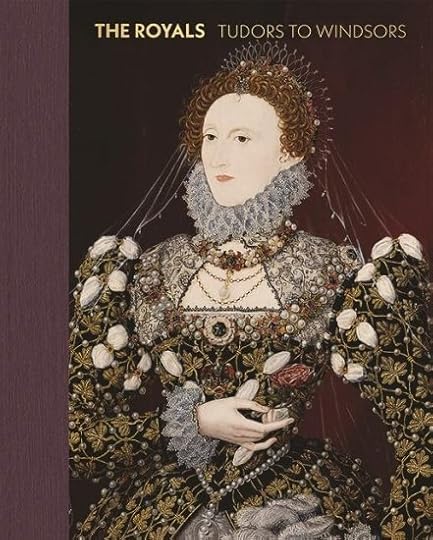
The Royals: Tudors to Windsors
Hardcover – 20 August 2024 (US)

Six Lives: The Stories of Henry VIII’s Queens
Hardcover – 20 August 2024 (US)
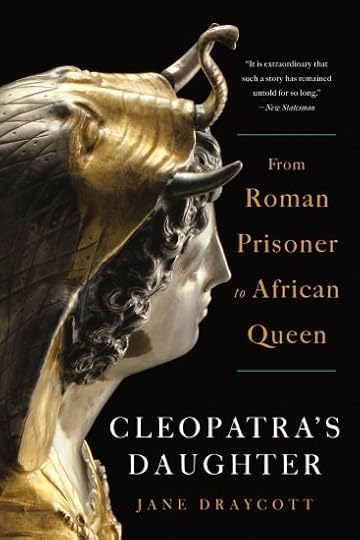
Cleopatra’s Daughter: From Roman Prisoner to African Queen
Paperback – 20 August 2024 (US)

Yes Ma’am: Upstairs Downstairs in the British Royal Family
Hardcover – 22 August 2024 (UK)

Majapahit: Intrigue, Betrayal and War in Indonesia’s Greatest Empire
Paperback – 22 August 2024 (US)
The post Book News Week 34 appeared first on History of Royal Women.
August 16, 2024
Empress Yin – The jealous deposed Empress of the Eastern Han Dynasty
[Not to be confused with Empress Yin Lihua: the second Empress of Emperor Guangwu]
Empress Yin was the first Empress of Emperor He of the Eastern Han Dynasty. She was Empress of China for six years. She has a negative image and is often depicted as villainous.[1] Chroniclers have portrayed her as the exact opposite of Empress Deng Sui, who became Empress Yin’s successor.[2] Empress Yin is often described as pompous and jealous.[3] She even consorted to witchcraft to kill her rival.[4] Thus, history has not been kind to her.[5]
In circa 80 C.E., Empress Yin was born. Her personal name is unknown.[6] Her father was Yin Gang. Her mother is also unknown. She was the great-grandniece of Empress Yin Lihua. She was known to be very intelligent.[7] She was well-versed in the classics and the arts.[8] In 92 C.E., Lady Yin entered Emperor He’s harem. She became Emperor He’s favourite Consort.
On 31 March 96 C.E., Consort Yin was invested as Empress of China. It was said that Empress Yin became jealous of her cousin, Consort Deng Sui (who would become the second Empress of Emperor He).[9] Consort Deng Sui was very respectful towards Empress Yin.[10] Chroniclers have mentioned how Consort Deng Sui was different from Empress Yin.[11] Empress Yin was very extravagant and loved fine clothes.[12] However, Consort Deng Sui disliked finery and dressed frugally.[13] “If by chance her clothing was the same as Empress Yin’s, she changed immediately.”[14] Thus, Empress Yin and Consort Deng Sui were often in conflict.[15]
Empress Yin was gradually losing Emperor He’s favour because she did not give him any children.[16] He began to transfer his affection for her to Consort Deng Sui.[17] Emperor He did not have any sons with both Empress Yin and Consort Deng Sui.[18] However, Consort Deng Sui provided Emperor He with suitable concubines in order for him to bear an heir.[19] Because of her jealousy, Empress Yin did not provide him with any concubines.[20] This ultimately made Empress Yin lose all of Emperor He’s favour.[21] He ignored and neglected Empress Yin.[22] Empress Yin became so jealous of Consort Deng Sui that chroniclers claimed she practised witchcraft to try to kill her.[23]
When Emperor He fell ill, Consort Deng Sui heard that Empress Yin wanted to kill her whole clan.[24] Consort Deng Sui wept.[25] She tried to commit suicide by swallowing poison, but her servants stopped her.[26] The next day, Emperor He recovered. When he learned of the incident, Emperor He was furious.[27] He ordered Empress Yin to be arrested for charges of witchcraft.[28] Empress Yin was found guilty.
On 24 July 102 C.E., Empress Yin was officially deposed. Consort Deng Sui tried to stop Empress Yin’s deposition but failed.[29] The deposed Empress Yin was forced to move to another palace.[30] Shortly after her arrival, the deposed Empress Yin “died from worry.”[31] Her father, Yin Gang, committed suicide. The rest of her clan was either executed or exiled.[32] Empress Deng Sui became Empress in the winter of 102 C.E. When Deng Sui became Empress Dowager, she spent her regency rehabilitating the Yin clan.[33]
Empress Yin was originally loved by Emperor He.[34] However, the fact that she did not bear Emperor He any sons made her lose his favour.[35] Her barrenness caused her to be jealous of others.[36] Unlike Empress Deng Sui, who put the interests of the country first, Empress Yin did not.[37] Instead, she put her own interests above her country’s.[38] Thus, Empress Yin will be forever remembered as the jealous and nefarious Empress who threatened the security of the Eastern Han Dynasty.[39]
Sources:
McMahon, K. (2013). Women Shall Not Rule: Imperial Wives and Concubines in China from Han to Liao. NY: Rowman and Littlefield.
Milburn, O. (2021). The Empress in the Pepper Chamber: Zhao Feiyan in History and Fiction. Seattle: University of Washington Press.
Wong, Y. N., & Che, W. W. (Trans.). (2015). “Deng Sui, Empress of Emperor He”. Biographical Dictionary of Chinese Women: Antiquity Through Sui, 1600 B.C.E. – 618 C.E. (L. X. H. Lee, Ed.; A. D. Stefanowska, Ed.; S. Wiles, Ed.). NY: Routledge. pp. 122-126.
[1] McMahon, 2013; Milburn, 2021
[2] McMahon, 2013
[3] McMahon, 2013; Milburn, 2021
[4] Wong and Che, 2015
[5] McMahon, 2013
[6] McMahon, 2013
[7] McMahon, 2013
[8] McMahon, 2013
[9] Milburn, 2021
[10] McMahon, 2013
[11] McMahon, 2013
[12] Wong and Che, 2015
[13] Wing and Che, 2015
[14] McMahon, 2013, p. 103
[15] McMahon, 2013
[16] Wong and Che, 2015
[17] Wong and Che, 2015
[18] Wong and Che, 2015
[19] Wing and Che, 2015
[20] Wong and Che, 2015
[21] Wong and Che, 2015
[22] Wong and Che, 2015
[23] Wong and Che, 2015
[24] McMahon, 2013
[25] McMahon, 2013
[26] McMahon, 2013
[27] Wong and Che, 2015
[28] Wing and Che, 2015
[29] McMahon, 2013
[30] McMahon, 2013
[31] McMahon, 2013, p. 104
[32] McMahon, 2013
[33] McMahon, 2013
[34] Wong and Che, 2015
[35] Wong and Che, 2015
[36] Wong and Che, 2015
[37] McMahon, 2013
[38] McMahon, 2013
[39] Milburn, 2021
The post Empress Yin – The jealous deposed Empress of the Eastern Han Dynasty appeared first on History of Royal Women.
August 15, 2024
The Dutch Sapphire Parure Tiara
The Dutch Sapphire Parure Tiara consists of 655 brilliants and 32 sapphires and made perhaps its most famous outing on the head of Queen Maxima during the inauguration of her husband, King Willem-Alexander of the Netherlands.
Embed from Getty ImagesThe largest sapphire has an intersection of 2 centimetres and consists of 44 carats, and probably came from the legacy of Anna Pavlovna, the wife of King William II of the Netherlands.
King William III bought the sapphire tiara and two bracelets for his second wife, Emma of Waldeck and Pyrmont, in 1881 for 100,000 florins. The tiara was designed by Vita Israël and made by the jeweller Maison van der Stichel. The tiara was set onto a new frame in 1928, probably because the original gold frame had deteriorated.
Embed from Getty ImagesIt can currently be worn with or without the taller diamond element.1
The post The Dutch Sapphire Parure Tiara appeared first on History of Royal Women.
August 14, 2024
The Year of Isabella I of Castile – The death of Isabella’s mother
On 15 August 1496, Queen Isabella I of Castile’s mother, Isabella of Portugal, died at Arévalo.
The elder Isabella was born sometime in 1428 as the daughter of John, Constable of Portugal, the fourth son of King John I of Portugal, and his half-niece, Isabel of Barcelos. She married King John II of Castile on 22 July 1447, who had previously been married to Maria of Aragon. She was around 19 years old while he was 42. He also had one surviving son, the future King Henry IV of Castile.
At the time, Isabella was described as beautiful, sweet-natured and demure. The poet Íñigo López de Mendoza described her as a “genteel person and face” worthy of a Giotto fresco.1 John was infatuated with her, and on 22 April 1451, she gave birth to her namesake daughter, Isabella. A son named Alfonso followed on 17 November 1453.
Isabella’s genteel personality did not stop her from entering politics. One observer wrote, “The young lady found opportunities to counsel him in secret, which was good for both the king’s own honour and the security of the throne.”2 She also managed to bring about the downfall of one of the King’s favourites, Alvaro de Luna. Isabella was widowed on 20 July 1454, and he was succeeded by his eldest son, Henry.
Isabella and her two young children moved to Arévalo, where she reportedly “shut herself in a dark room, condemning herself to silence.” She was apparently showing signs of “growing madness.”3 Her “madness” likely had its origins in postpartum depression as she had not been the same since the younger Isabella’s birth after which she reportedly launched into a “profunda tristeza”4 and would speak to no one but her husband.5
Her mental health did not improve when her children were asked to come to court in 1461. The younger Isabella later wrote, “Alfonso and I, who were just children at the time, were inhumanely and forcibly torn from our mother’s arms and taken into Queen Juana (Joan)’s power.”6 The elder Isabella remained behind at Arévalo with her own mother, Isabel, who was “a notable woman of great counsel” and a “great help and consolation to her daughter.”7 Isabel died on 26 October 1466.
The younger Isabella and Alfonso returned to Arévalo in 1467 after Alfonso had become the face of the rebellion in the face of the possible illegitimacy of King Henry’s daughter, Joanna. They celebrated Alfonso’s 14th birthday with the three of them. They stayed there until they were forced to flee due to an outbreak of the plague at the end of June 1468. Alfonso died not much later at the age of 14, and the younger Isabella became the new face of the rebellion. The younger Isabella continued to visit her mother once or twice a year after she eventually became Queen, but the elder Isabella was mostly a recluse.
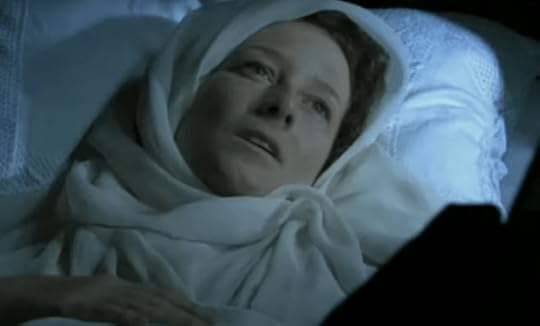 The scene as portrayed in Isabel (2011) (Screenshot/Fair Use)
The scene as portrayed in Isabel (2011) (Screenshot/Fair Use)The elder Isabella died on 15 August 1496, just as her granddaughter Joanna was preparing to leave for Flanders. Although the elder Isabella had been “worn out and enfeebled by age”, the younger Isabella was hit hard by the news of her mother’s death.8 She was only sick for a few days before her death.9
 Queen Isabella learns of her mother’s death, as portrayed in Isabel (2011)
Queen Isabella learns of her mother’s death, as portrayed in Isabel (2011)The younger Isabella said goodbye to her daughter and immediately turned her attention to arranging her mother’s funeral procession and burial. She wanted to ensure her mother was “carried honourably as became a Queen.”10
Queen Isabella ordered her mother’s body to be transferred to the Carthusian monastery near Burgos, “where she laid her to rest near her father King Juan [John] and her brother Alfonso, who had died so young himself.”11
The post The Year of Isabella I of Castile – The death of Isabella’s mother appeared first on History of Royal Women.
August 13, 2024
Magdalena of Austria – The venerable Archduchess
Magdalena of Austria was born on 14 August 1532 as the daughter of the future Ferdinand I, Holy Roman Emperor and Anne of Bohemia and Hungary. She was their sixth child and fourth daughter, and she was born in Innsbruck.1
She was just 14 years old when her mother died in childbirth. The sisters were educated by Countess von Thurn, a woman “of rare intellect and solid piety.”2 Magdalena was especially adept at languages such as Latin and Italian.
Alongside her sisters Helena and Margaret, she expressed the wish to stay unmarried. On 1 January 1564, Rome was informed that the three Archduchesses “consecrated their virginity to God and decided to withdraw from the noise and splendour from the court as soon as possible.”3 Magdalena especially was known to be extremely pious, and she received the sacrament often.
Nevertheless, their father was not happy with their plans and he asked his daughter Anna to persuade Magdalena to marry the Duke of Ferrara. He eventually relented.4 Following her father’s death in 1564, she wore mourning clothes for the rest of her life.
The three sisters founded the Ladies’ Convent of Hall together, which opened in 1568. Unfortunately, her sister Margaret would not live long enough to move in. On their move-in day, Magdalena wrote, “On the 5th day of December, we come to Hall to move into our house. Thank God Almighty that it came to this. He wants to bestow his grace that the days may be ours. Life in this state serves God rightly and pleasingly. Amen. “5
Helena died in 1574 as well, and Magdalena led the convent alone for the next 22 years. She drew up statutes, mandated regular times of prayer, and attended mass three times a day.
She died on 10 December 1590 of dysentery at the convent and was interred alongside her sisters. 6 She specifically requested that there would be no marble monument to mark her grave. Instead, there is a simple slab. As part of her will, she wrote, “Above all, love and fear God.”7
In 1706, her coffin was moved, and her body was found to be remarkably well-preserved. Steps were made for her beatification, which currently lies dormant.
The post Magdalena of Austria – The venerable Archduchess appeared first on History of Royal Women.
August 11, 2024
Empress Guo Shengtong – The luckiest deposed Empress in Chinese history
Empress Guo Shengtong was the first Empress of Emperor Guangwu of the Eastern Han Dynasty. She was Empress for fifteen years and bore him six children. Yet, she was deposed for political reasons.[1] However, historians consider her to be very lucky.[2] After her deposition, Empress Guo Shengtong enjoyed a comfortable life.[3] Even though she would no longer be an Empress, she would still be highly respected as a Princess Dowager.[4] Thus, Empress Guo Shengtong was able to avoid the miserable fate of other deposed Chinese Empresses.
In circa 6 C.E., Empress Guo Shengtong was born in Gao District in Zhendong Commandery (southwest of modern-day Gaocheng District in Hebei Province).[5] She was from a prominent family in Northern China.[6] Her father was Guo Chang, who worked in the Labor Section in the commandery.[7] Guo Chang was known for his generosity.[8] He gave a large portion of his property to one of his younger half-brothers.[9] Guo Shengtong’s mother was Princess Guo.[10] Princess Guo was the daughter of Prince Liu Pu, a descendant of Emperor Jing.[11] Guo Shengtong’s uncle was Liu Yang, Prince of Zhending.
Prince Liu Yang supported Liu Xiu in becoming Emperor of China.[12] In 24 C.E., Guo Shengtong married Liu Xiu. It was a political marriage.[13] Liu Xiu already had another wife named Yin Lihua. In 25 C.E., Guo Shengtong bore Liu Xiu a son named Liu Qiang.
On 5 August 25 C.E., Liu Xiu ascended the throne at Hao (modern-day Hebei Province) as Emperor Guangwu. He gave Guo Shengtong the rank of Worthy Lady (the highest rank below the Empress).[14] Emperor Guangwu then moved to Luoyang, where he made it the capital of the Eastern Han Dynasty.[15] Emperor Guangwu sent for his first wife, Yin Lihua, to join him in Luoyang.[16] He wanted to make Yin Lihua his Empress.[17] However, Yin Lihua refused the Empress position. She believed that Worthy Lady Guo Shengtong should be the Empress because Worthy Lady Guo Shengtong had a son, and she did not.[18]
On 10 July 26 C.E., Guo Shengtong was invested as Empress of China. Her son, Liu Qiang, was made the Crown Prince. Yin Linhua was given the title of Worthy Lady. Empress Guo Shengtong remained Empress for fifteen years.[19] During her reign, she bore four more sons. They were Liu Fu (Prince Xian of Pei), Liu Kang (Prince An of Jinan), Liu Yan (Prince Zhi of Fuling) and Liu Yan (Prince Jian of Zhongshan).[20] She also bore a daughter named Princess Guantao.
On 1 December 41 C.E., Empress Guo Shengtong was officially deposed. He issued an edict in which he complained that she lacked “queenly virtue.”[21] He claimed that her behaviour was similar to Empress Dowager Lu Zhi and Empress Huo Chengjun.[22] However, Empress Guo Shengtong did not behave like a queen who had no virtue.[23] Therefore, historians believe that her deposition was motivated solely based on politics.[24]
When Empress Guo Shengtong first became Empress, Emperor Guangwu needed to satisfy the Northerners (where Empress Guo Shengtong was from) because they helped him become the Emperor.[25] As years passed, the Northerners’ power in court gradually diminished.[26] Emperor Guangwu’s supporters from Nanyang (where Worthy Lady Yin Lihua was from) eventually became Emperor Guangwu’s sole power base.[27] Thus, Emperor Guangwu no longer needed the Northerners’ support, but he did need the support of those from Nanyang.[28] The supporters from Nanyang had been pressuring him for years to make Worthy Lady Yin Lihua his Empress and to install her son as the Crown Prince.[29] It is because of this intense political situation that Emperor Guangwu deposed Empress Guo Shengtong.[30] It was also the reason why Empress Guo Shengtong’s son, Liu Qiang, resigned from his position as the Crown Prince.[31] Liu Qiang was given the title of the Prince of Donghai.[32] Yin Lihua was immediately invested as Empress, and her son, Liu Zhang (the future Emperor Ming), became the Crown Prince.[33]
Even though Empress Guo Shengtong was deposed, Emperor Guangwu took special care of her.[34] When her son, Liu Fu, was promoted to Prince of Zhongshan, the deposed Empress Guo Shengtong was made Princess Dowager of Zhongshan.[35] Emperor Guangwu allocated the taxes of Changshan Commandery to Princess Dowager Guo Shengtong, which provided for her financially.[36] When Liu Fu was further promoted to Prince of Pei, she became the Princess Dowager of Pei.[37] Emperor Guangwu also promoted her relatives.[38] After Empress Guo Shengtong’s deposition, her younger brother, Guo Kuang, was given the title of Marquis of Anyang and was promoted to Chamberlain-For-Dependencies.[39] Emperor Guangwu made Princess Dowager Guo Shengtong’s cousin, Guo Jing, the Marquis of Xinqi and promoted him to Minister of Donghai.[40] When her mother died, Emperor Guangwu participated in her funeral procession.[41] He buried her mother next to her father.[42] He also gave her father the posthumous title Marquis Si of Yang’an.[43]
On 22 July 52 C.E., Princess Dowager Guo Shengtong died of illness.[44] She was forty-six years old. She was given the funeral rites of a Princess Dowager and not as an Empress. She was buried in Beimang. After Princess Guo Shengtong’s death, Emperor Guangwu arranged for Princess Yuyang (Empress Yin Lihua’s daughter) to marry Guo Kuang’s son, Guo Huang.[45] This was to ensure that Crown Prince Liu Zhang and Empress Yin Lihua would not persecute the deposed Empress Guo Shengtong’s sons and her family in the future.[46] He wanted both the Yin and the Guo clans to live peacefully with each other.[47]
Usually, deposed Chinese Empresses often suffer a miserable and tragic life after their deposition.[48] However, Empress Guo Shengtong did not suffer that fate. Emperor Guangwu ensured that Empress Guo Shengtong would still maintain a comfortable life after her deposition.[49] She was given many privileges and honours.[50] It is no wonder why she is considered by many historians to be China’s luckiest deposed Empress.[51] Empress Guo Shengtong is portrayed by actress Wang Yuanke in the Chinese historical drama Singing All Along.
Sources:
iMedia. (n.d.). “Guangwu Emperor and Guo Shengtong are behind a naked political deal”. Retrieved on 21 October 2023 from https://min.news/en/history/7c831a8df....
Laitimes. (2022, 1 January). “Guo Shengtong was deposed from the throne in the seventeenth year of Jianwu and was made empress dowager of Zhongshan, Liu Xiu was still alive, why was she the empress”. Retrieved on 21 October 2023 from https://www.laitimes.com/en/article/1....
McMahon, K. (2013). Women Shall Not Rule: Imperial Wives and Concubines in China from Han to Liao. NY: Rowman and Littlefield.
Wong, Y. N., et al. (2015). “Guo Shengtong, Empress of Emperor Guangwu”. Biographical Dictionary of Chinese Women: Antiquity Through Sui, 1600 B.C.E. – 618 C.E. (L. X. H. Lee, Ed.; A. D. Stefanowska, Ed.; S. Wiles, Ed.). NY: Routledge. pp. 145-148.
[1] McMahon, 2013
[2] Wong, et al, 2015
[3] Wong, et al, 2015
[4] Wong, et al, 2015
[5] Wong, et al, 2015
[6] McMahon, 2013
[7] Wong, et al, 2015
[8] Wong, et al, 2015
[9] Wong, et al, 2015
[10] Wong, et al, 2015
[11] Wong, et al, 2015
[12] Wong, et al, 2015
[13] Wong, et al, 2015
[14] Wong, et al, 2015
[15] Wong, et al, 2015
[16] Wong, et al, 2015
[17] McMahon, 2013
[18] McMahon, 2013
[19] Wong, et al, 2015
[20] Wong, et al, 2015
[21] McMahon, 2013, p. 101
[22] McMahon, 2013
[23] Wong, et al, 2015
[24] McMahon, 2013
[25] McMahon, 2013
[26] McMahon, 2013
[27] McMahon, 2013; iMedia, n.d., “Guangwu Emperor and Guo Shengtong are behind a naked political deal”
[28] McMahon, 2013
[29] McMahon, 2013
[30] McMahon, 2013
[31] McMahon, 2013
[32] Wong, et al, 2015
[33] Wong, et al, 2015
[34] Wong, et al, 2015
[35] Wong, et al, 2015
[36] Wong, et al, 2015, Laitimes, 1 January 2022, “Guo Shengtong was deposed from the throne in the seventeenth year of Jianwu and was made empress dowager of Zhongshan, Liu Xiu was still alive, why was she the empress”
[37] Wong, et al, 2015
[38] Wong, et al, 2015
[39] Wong, et al, 2015
[40] Wong, et al, 2015
[41] Wong, et al, 2015
[42] Wong, et al, 2015
[43] Wong, et al, 2015
[44] Wong, et al, 2015
[45] Wong, et al, 2015
[46] iMedia, n.d., “Guangwu Emperor and Guo Shengtong are behind a naked political deal”
[47] iMedia, n.d., “Guangwu Emperor and Guo Shengtong are behind a naked political deal”
[48] Wong, et al, 2015
[49] Wong, et al, 2015
[50] Wong, et al, 2015
[51] Wong, et al, 2015
The post Empress Guo Shengtong – The luckiest deposed Empress in Chinese history appeared first on History of Royal Women.
August 10, 2024
Book News Week 33
Book News Week 33 – 12 August – 18 August 2024

The Boleyns: From the Tudors to the Windsors
Paperback – 15 August 2024 (US)
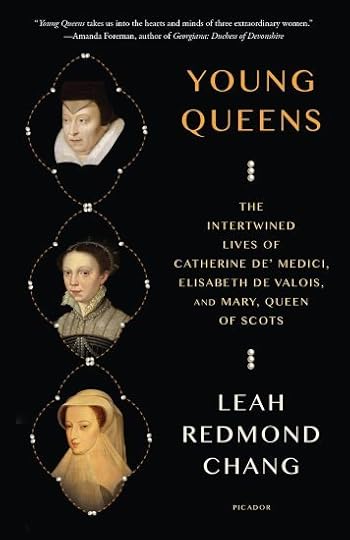
Young Queens: The Intertwined Lives of Catherine de’ Medici, Elisabeth de Valois, and Mary, Queen of Scots
Paperback – 13 August 2024 (US)
The post Book News Week 33 appeared first on History of Royal Women.



